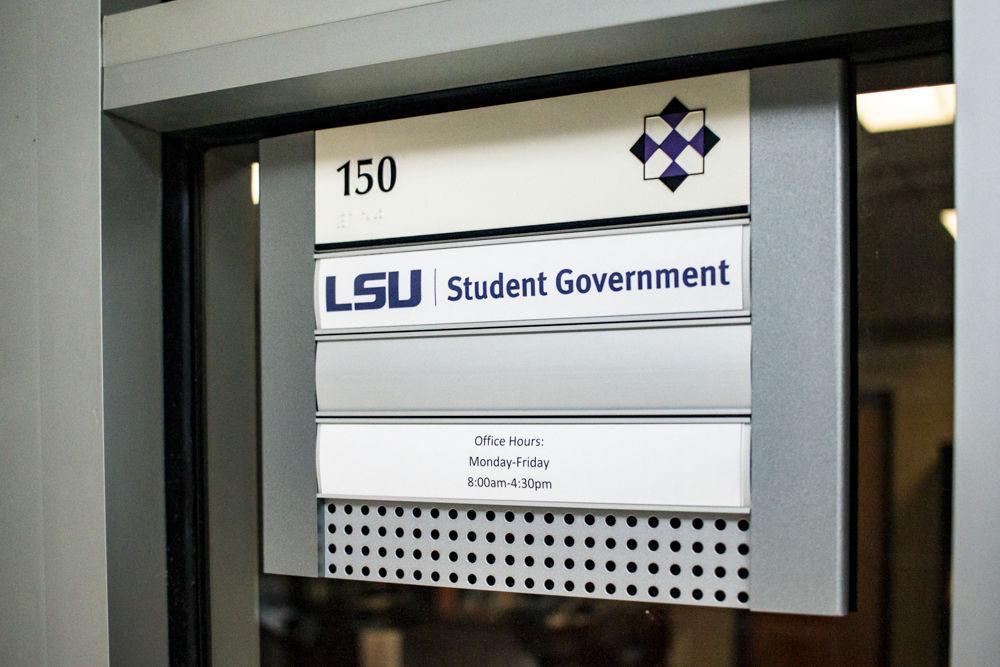When LSU students shared their experiences with sexual assault on Twitter in June 2020 under the hashtag #ShowYourself, two members of Student Government started brainstorming ideas to increase sexual assault prevention on campus. They worked with student senators to write a bill that would do just that, but the bill was vetoed Nov. 6 by Student Body President Stone Cox and his Deputy Chief of Staff and Co-President of Tigers Against Sexual Assault Angelina Cantelli.
The bill would have required student organizations’ leadership to participate in sexual assault training in order to receive SG Senate funding. It would have mandated organization leaders to schedule interactive sexual assault training programs with either TigerBITes, a University program that provides bystander intervention training, or Sexual Trauma Awareness and Reponse (STAR), which provides sexual trauma support services.
The bill would also have required organizations to confirm plans to amend their bylaws to implement standards of conduct regarding sexual harassment and assault and promote resources for handling those issues to members.
SG Senate Speaker Justin Martin and SG Director of Diversity Alaysia Johnson originally met with Director of Campus Life Jacob Brumfield to discuss implementing sexual assault training requirements across all student organizations, not just those who seek Senate funding.
“He told us that if SG can get organizations to take the training in spring 2021, Campus Life would assess the situation and consider requiring it for all organizations come fall 2021,” Martin said. “Implementing training to that many people would be a big step for the University to take in a semester or two, so we figured we could implement something on a smaller scale as SG.”
Martin and Johnson partnered with three student senators to write the bill. It passed through the Senate, but when it came time for Cox to sign off on it, he vetoed the bill.
Cox said that SG does not have the power to mandate other organizations to change their bylaws and that the legislation would be difficult to enforce. He outlined several other reasons for the veto in a letter to SG Senate.
Cox noted that because TigerBITes training is “more rigorous than most sexual assault trainings,” it would be unfair to require student organization leadership to take a course more rigorous than SG has to participate in, since SG members can take part in other bystander intervention trainings besides TigerBITes and STAR. He said that SG should not add additional requirements that would make it harder for student organizations to gain access to funds.
Martin said there are several requirements student organizations have to meet to get funding anyway, including stipulations about what items they can purchase with the funding.
“If people were supposed to get funding without requirements, we wouldn’t be making requirements in the first place,” Martin said. “This requirement would require more effort, but it gives SG a way to tell student orgs that these are things that need to be addressed.”
Cox noted in the veto that the influx of students requesting training from the two programs could overwhelm the Student Health Center and STAR. Senator Drake Brignac said that he can “count on his fingers and toes” the number of student organizations that come to the Senate for funding.
Martin said there are less than 10 student organizations that seek funding from SG Senate each year. Because the bill would have required only their executive boards to participate in training, he said that there’s no way the programs would be overwhelmed.
“We’re talking less than 200 people signing up for sexual assault training,” Martin said. “With a veto like that, you don’t know if they have problems with the logistics of the bill or with what [the bill] is about.”
Senators Matt McClure and Angel Puder, two authors of the bill, said they would have worked with Cox and Cantelli and addressed their concerns in the bill if they had known the bill would be vetoed as it was written.
Cantelli said that Cox came to her as the co-president of Tigers Against Sexual Assault to make an informed decision about the legislation, but her signage of the veto does not reflect the views of TASA.
“We agree that there should be better education about sexual assault, but we want it to be enacted in the most effective way that wouldn’t make it harder for student orgs to get access to their money,” Cantelli said.
She said there were several misunderstandings between members of SG involved in developing the bill. She said that she negotiated the terms of the bill between Cox and the authors, and she expected to see the bill encourage student organization leadership to participate in sexual assault training without mandating it.
“Honestly if we would have communicated better this whole problem could have been avoided,” Cantelli said. “I take fault for that.”
Several SG senators took to Twitter to express their frustration with the veto, including architecture junior Harris Quadir. His tweet expressed disappointment in SG leadership that upheld the veto; it received over 250 likes and 76 retweets.
“These leaders say that they’re against sexual assault, that they want to increase measures to prevent it, but then they veto this bill without consulting with the senators that wrote it,” Quadir said. “I just want to ask them, ‘What is your alternative?’”
LSU Senate Vice Chair of Student Life, Diversity and Community Outreach Devin Scott announced via Twitter Tuesday that the Senate will hear a bill Wednesday “to Urge and Request Campus Life to Require Registered Student Organizations’ Executive Board and/or Leadership to Complete Bystander Intervention Training with a Focus on Sexual Assault.”
This article will be updated as more information becomes available.








